Africa-Press – Botswana. A delegation from Botswana’s Gambling Authority, Botswana Horse Racing Association (BHRA) and Botswana National Sports Commission (BNSC) recently visited Windhoek to inspect the new horse racing start gates and attend the Spring Cup in Okahandja.
The four-day trip, which started on September 24 and ran to September 27, aimed to gather insights and expertise on the latest starting gate technology as part of a broader effort to replace Botswana’s traditional rope barriers that have long sparked disputes over uneven starts.
Start gates are advanced mechanical barriers designed to ensure a fair start for all competing horses. The gates provide a simultaneous release of all horses, which eliminates the possibility of one horse getting a head start or advantage over others.
This visit by Botswana’s officials to Namibia’s horse racing industry follows a July agreement between the gaming authorities of both countries to facilitate technology sharing. According to a BHRA official, installing the start gates at Botswana’s racing tracks could boost betting and attendance at tracks in Gaborone and Francistown, creating jobs for riders and stable workers.
On Saturday, 27 September, the group observed the Spring Cup, a high-energy horse racing event hosted by Okahandja Racing that drew more than 60 horses from clubs across Namibia for 19 short sprints and N$211,000 (€10,413) in total prizes.
Highlights included the main thoroughbred race, contested over 2,400 metres, and the Nambred Elite Plate at 1,600 metres, with entertainment from a live DJs and artists performing Oviritje and Maxaisa music to draw crowds. Katiti Komambo from Okahandja Racing and Pee Jay from Professor Supporters Club took the top spots in the main races, earning trophies and medals alongside jockey prizes.
Botswana officials studied crowd management, prize payouts and overall logistics, taking notes on how to enhance their own events like the Masa Easter Cup and Motokwe Champions Cup. Back home, the implementation of this expertise could begin by early 2026, starting with tests of the new gates at a major derby, potentially boosting betting and attendance at tracks in Gaborone, Francistown and Maun.
These changes could also benefit local trainers and owners in Botswana significantly. Fairer starts could lead to bigger payouts, helping to cover everyday expenses like feed and vet bills for those who balance farm work with training.
The BHRA, now affiliated with the BNSC, continues to push for a national strategy to professionalise the sport, drawing on Namibia’s experience to create jobs for riders, stable workers and support staff. With horse racing valued at P402 million (€24.3m) nationally, leaders like Gambling Authority CEO Peter Kesitilwe and Sports Minister Jacob Kelebeng have highlighted its role in economic growth and community ties.
For More News And Analysis About Botswana Follow Africa-Press






